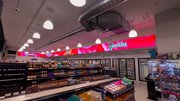Article
Digital download tech takes aim at DVD rental kiosks
Warner Bros. and Paramount have become the first major studios to allow retail digital delivery. Does the agreement signal a new business model for movie kiosks?

January 26, 2009
Earlier this month, when Warner Brothers and Paramount Digital Entertainment signed agreements with software startup MOD Systems, history was made, albeit quietly. For the first time, MOD Systems could legally distribute motion pictures from the two studios via digital download to SD cards.
But more importantly, the agreements marked the first serious acknowledgement by any major studio that digital download via a self-service kiosk is a viable retail delivery channel.
"It's a very big deal," said Adrienne Lenhart, director of marketing for MOD Systems. "The studios are very, very, very selective about who they go with, especially when choosing something that's a new format."
The news is raising eyebrows, causing some to wonder if it signals a paradigm shift in the way movie content is delivered. Until now, redbox has been the undisputed champion when it comes to movie kiosks, but its kiosks dispense DVDs. Now, some are wondering whether digital download may emerge as the next contending format.
The digital triangle
MOD Systems, NCR Corp. and Toshiba have all partnered to get a foothold in the digital download business model. In September 2008, NCR and Toshiba announced $35 million in funding for MOD Systems.
"Toshiba is interested in working with us because they're planning on putting a lot of emphasis on SD card technology in all of their consumer electronics devices," Lenhart said, citing TVs, DVD players and set-top boxes as examples of Toshiba products to receive the new card readers.
MOD Systems' digital download application will likely be hosted on NCR's recently unveiled NCR Xpress Entertainment movie kiosk, which in the future, could fitted to provide movies via DVDs or digital downloads.
In the past, critics have argued that digital download applications simply aren't feasible because the user has to wait several minutes — perhaps even hours — to download a feature-length motion picture. But Lenhart said MOD Systems is currently demoing an application that would enable the transfer of standard-definition feature films to SD cards in under three minutes.
As for storage capacity, she also pointed to a 2 terabyte SD card recently exhibited at the Consumer Electronics Show by the SD Association, a trade association that publicly advocates SD technology. The card can hold up to 30 high-definition movies, 60 hours of high-definition audio or 17,000 fine-grade images, according to a news release.
"The curve with SD cards in terms of how fast they're evolving, in terms of their capacity and speed is just crazy-ridiculous," she said.
Not so fast ...
Gary Lancina, vice president of marketing for redbox, says the real money — at least for the time being — is still in DVDs, citing the growth of redbox DVD dispensing kiosks from 6,000 locations at the end of 2007 to more than 12,000 locations by the end of 2008.
"I do not anticipate the agreement with MOD Systems will have an immediate effect on the entertainment industry," said Lancina. "The majority of consumers still prefer physical media over alternative technologies." Lenhart capitulates that some consumers simply can't do without the slick packaging and artwork that comes with DVD purchases, but she said movie downloads could also come with digitized high-resolution versions of this artwork so the user can exhibit it on their big-screen televisions.
Lenhart capitulates that some consumers simply can't do without the slick packaging and artwork that comes with DVD purchases, but she said movie downloads could also come with digitized high-resolution versions of this artwork so the user can exhibit it on their big-screen televisions.
"It's sort of like what you see today with all of their DVDs lined up on the shelf," she said. "We're going to be offering something in sort of a digital experience that's similar to that so people can have a sense of ownership."
That said, both Lancina and Lenhart deny any competition between DVDs and SD cards, calling them "complementary technologies."
"We think optical and digital are going to exist together for quite some time," Lenhart said. "I think you're probably going to see a lot of growth in digital — perhaps more so than in optical. But we definitely see them co-existing together."
Digital download in the retail environment?
The problem with deploying digital download kiosks in a retail environment, according to technology blogger Davis Freeburg, is that they're simply not in demand. The proliferation of high-speed Web connections like broadband, as well as digital media software such as BitTorrent and DivX, have eliminated the need for a movie kiosk — or a retailer — altogether.
"If you're dealing with an electronic file, you're not going to go to the store for that," Freeburg said. "You're going to download it off the net ... versus actually going to a store and remembering to have your memory stick with you so you can load it up with the movie and take it home."
But even more significant will be the issue of price. Freeburg says DVD kiosks and digital download technology utilize completely divergent business models. Companies like redbox purchase DVDs from commercial resellers and — under the legal doctrine of fair use — rent them to consumers repeatedly without paying any licensing fees to the studios, enabling them to charge only $1.00 per day. It's a business model that was recently challenged by Universal Studios.
Under the digital download business model, the deployer never gains ownership of the digital copy of the motion picture — it's still retained by the studio. Thus the studios, Freeburg says, will demand a share of the profits for every rental that takes place at the kiosk. That means the kiosk deployers will likely have to jack up the price for consumers.
"When push comes to shove for the kiosk companies [digital download] is going to be a really bad deal for them because they're going to have to pay for all of these licensing fees that they don't have to pay today," Freeburg said.
But despite the naysayers, MOD Systems, Toshiba and NCR are moving ahead with plans to trial digital download kiosks in the retail sector.
"I believe you'll see some pilot deployments this year — probably a little closer to summer," Lenhart said. "We're being pretty careful about picking the right customer to go out with. We want somebody who is very much a market leader."
Lenhart is evasive when pressed for names, saying only that they've spoken with a lot of "big name retailers."
"Yeah, it will be a name you know," she said.
 ChatGPT
ChatGPT Grok
Grok Perplexity
Perplexity Claude
Claude





